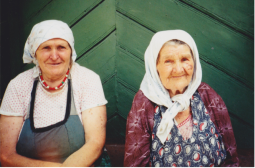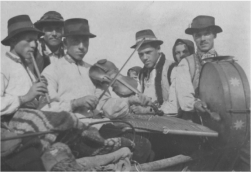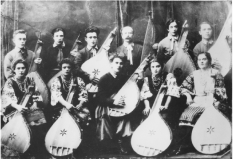—What was the name of the neighborhood [kutok] where you were born?
Natalia Hryhorivna: Kuchansky neighborhood was in the lower part of the village. Others were Vyshchy, Shevchenkivsky, Yasynkivsky, Chernyshishivsky, and Kolesoshcha a bit farther away.
………………………………………………………………………………………..
—What was your farmstead like before collectivization? What kind of work did your family do?
Natalia Hryhorivna: We sowed and plowed. My father had no other trade.
—How much land did you have?
Natalia Hryhorivna: Around seven desiatyny. We harvested and sold the grain, and later a tax was imposed—how much grain to give to each khaziaiin.
………………………………………………………………………………………..
—Where was the market fair held?
Natalia Hryhorivna: There was a wheat market fair in Kaniv and Khodoriv.
—Did anyone produce anything in your village?
Natalia Hryhorivna: No. Some people made monuments out of stone, but mostly it was farming. My father-in-law had a large farmstead because his father was a chumak. He used to go to Crimea to buy salt and roach and he bought a mill (tovpchak) for his son.
—What was the grandfather’s name?
Natalia Hryhorivna: Yosyf was my father-in-law. My father’s name was Hryhorii Khvylonovych. My father was poor because he became an orphan when he turned five, so everyone left. My father went to work for the rich as a day laborer. We didn’t live at home because we worked elsewhere.
………………………………………………………………………………………..
—Did your family weave?
Natalia Hryhorivna: Yes, I was a weaver myself. My now deceased father made a very good loom for us. One spring, we paid twenty-five pounds of grain for a loom. Then we made our own from viburnum, and I prepared the threads and wove cloth for the people.
—Did people also make woolen overcoats (svyty)?
Natalia Hryhorivna: Yes, people had the sheep and wove the woolen cloth before the Revolution. I had two shirts when I was getting married that my father made for me. I also had an overcoat (kozhukh).
—Did your father have a kyreia or a kobeniak [types of coats]?
Natalia Hryhorivna: He had a kobeniak.
………………………………………………………………………………………..
—Were there any potters?
Natalia Hryhorivna: Not a single one in our village.
—Where were the potters?
Natalia Hryhorivna: In Dubynytsi and Bohuslav, above the Ros river. They took the pots to Khodorov, and we used to buy them here.
………………………………………………………………………………………..
—Did you have any day laborers?
Natalia Hryhorivna: My father didn’t have any. Occasionally, he’d hire people to thresh the grain and cover the roof in the winter. We had a barn; we used two pairs of horses to bring two beams for the barn from Pshenyshnytsky forest where we made a deal with the foresters. The people from another village used to come with their chains to thresh.
—Were they paid well?
Natalia Hryhorivna: Of course. They were paid with grain.
………………………………………………………………………………………..
—Who were those called kurkuli?
Natalia Hryhorivna: The hardworking people. My father was very hardworking and appreciated by the people; he liked to work with his hands. His house was one of a kind in the whole village: it had a pediment and a second floor. How was he a kurkul if he had seven desiatyny of land, and his father-in-law had ten? My paternal grandfather, a chumak, had ten desiatyny, and he gave my father an oil mill and a machine to make millet. He had a yard for cattle and many pigs.
………………………………………………………………………………………..
—How many rich people were there in the village?
Natalia Hryhorivna: Three were exiled to Vologda in the beginning. Later on, they started dispossessing the people like my father; I don’t know how many such families there were, perhaps three. They would come for mandatory donation of food to the state (prodzdacha). One had to give a certain amount of grain to the state. We gave and gave; they took all the grain; nothing was left, but they kept imposing a quota to give; then they labeled us kurkuli in order to be able to deport the people and not let them live at all. They came to our house and took everything. One Naumenko came from Rzhyshchevsky (a regional administrative center), evicted us from our house and locked it; we were outside. My now deceased father took my baby son Hrysha into his arms and cried, “I worked so long to earn this, and now this is what I get for my old age.” We cried for some time and started thinking what to do next because it was winter. That administration activist moved into my father’s warm house right away. What could we do? We went looking for a house and found a small one on the corner. The woman owner let us in.
………………………………………………………………………………………..
—Did many people agree to join the kolhosp?
Natalia Hryhorivna: No one agreed, but they were forced…
………………………………………………………………………………………..
—Was everyone forced to join the kolhosp right away?
Natalia Hryhorivna: Everyone. Some remained as odnoosibnyky. I remember one man who had many children but didn’t join the kolhosp. His children died. People who were in the kolhosp were getting something.
—Was he heavily taxed?
Natalia Hryhorivna: Yes.
………………………………………………………………………………………..
—What was the attitude like toward those who didn’t join the kolhosp?
Natalia Hryhorivna: They were treated poorly. No one gave them anything.
………………………………………………………………………………………..
—Who conducted collectivization: locals or newcomers?
Natalia Hryhorivna: They came from the regional administrative center, from Rzhyshchiv. The locals were activists from the ranks of poor folk.
—Who was crueler?
Natalia Hryhorivna: The locals. They tortured people.
………………………………………………………………………………………..
—Where were you during the famine?
Natalia Hryhorivna: We were in the Khvylivetsky radhosp on the Poltava side. We were not starving. We met some people; Marusia was an outrider, a kind of courier, and there was enough bread. There were beets in the field, and people went to dig them. My husband said to my father, “Stay here, father, and work as a guard, and you won’t starve.” But my father said, “No, son, I’ll go home and make a living fixing the nets for the boys.” So, he left and died in Zarubantsi.
………………………………………………………………………………………..
—How much were you paid by the kolhosp?
Natalia Hryhorivna: At first, nothing. We had enough if we planted our garden; we’d also bring our own produce to the kolhosp. We used to get two hundred grams. We would grind the corn and make maize porridge. It would get solid as jelly, and you could cut it into pieces and treat your children.
……………………………………………………………………………………….
—Were there no seredniaky anymore?
Natalia Hryhorivna: Not anymore.
—How did people treat those who were dispossessed?
Natalia Hryhorivna: Everyone was different. My husband came back to the village and was a brigade leader in the kolhosp. He got his documents. There was construction in the radhosp in Medovyk at the time. He used to make the feeders, and the head of the radhosp was his acquaintance and a good manager.
……………………………………………………………………………………….
—Where did people get the money for clothes and shoes?
Natalia Hryhorivna: They used to weave cloth and make the linen clothes by themselves. People would plant hemps and flax. The fabric made of hemp was good; people used it for embroidery, too. These paupers took everything people had, but they, too, died from famine in 1933.
……………………………………………………………………………………….
—Did you sell the produce on the market?
Natalia Hryhorivna: Yes, whatever was bountiful that year.
—And after the 1933 famine?
Natalia Hryhorivna: We sold products on the market, too.
—What about after the war?
Natalia Hryhorivna: Same. We sold products on the market. We had a cow after the war, so I tried to make fermented milk, cheese, butter, and eggs and take them to the market in Khodorov. I had two sons—Vania and Misha—who were students. They used to wear a yard coat (kufaika) to school because I couldn’t afford to buy them better clothes.
……………………………………………………………………………………….
—Who was the highest authority in the village after the kolhospy were set up?
Natalia Hryhorivna: The head of the village council. They gathered the poor people around the administration and organized the kolhosp.
—What was the role of the village priest at the time?
Natalia Hryhorivna: He didn’t play a major role. The head of the kolhosp was in charge of everything.
—What was the highest body of authority in the village at the time?
Natalia Hryhorivna: The assembly [zbory].
—Who made the decisions: the head of the kolhosp or the assembly?
Natalia Hryhorivna: The head of the kolhosp.
—Was he a local or a newcomer?
Natalia Hryhorivna: I don’t know, I don’t remember. The head of the village council was from another village, from Romashky. He was a cadet that threw us out of our house, a very bad man.
—Describe the assembly.
Natalia Hryhorivna: The people would go there because they were told to. They would raise hands to vote.
—Where was the assembly held?
Natalia Hryhorivna: In the village council. Women took part, too. We had women activists Olena Sadivska and Hontsia. They were the first activists.
—Did everyone who attended the assembly have equal rights?
Natalia Hryhorivna: They did. Those who were dispossessed could not vote; they were labeled public enemies.
……………………………………………………………………………………….
—Did you have a large family?
Natalia Hryhorivna: At home? Yes, large: my mother had fourteen children. Many of them died of smallpox. Seven of my brothers were buried in one grave after they died of smallpox. I know that Yukhym was the one who survived, but he died in the war.
—Can you remember the names of your brothers and sisters?
Natalia Hryhorivna: With difficulty. Radion was the oldest, and he lived until the age of eighty-two. He was a tractor driver all this time; he was extremely hardworking. He dug up the tractor before the war and dug it out after. Prokip was the younger one, and I had one sister Maria; she was younger. There were also Silvester, Ananii, and Hrysha. The priest gave them their names based on the church calendar. My husband’s name was Terentii Stepanovych. My mother-in-law used to say the priest named him Tereshko, but they didn’t like it and called him Terentii instead.
—How many daughters were there in the family?
Natalia Hryhorivna: Two daughters died when they were little. Oryshka. Maria was in Kyiv; she was older than me. she was born in 1906.
………………………………………………………………………………………..
—Did your family live in one house?
Natalia Hryhorivna: Yes. My father built a large house because he was hard-working. He said, “Children, I served [in the army?] for fifteen years, worked as a day laborer, and went to sea. I’ve been so many places and earned the money to buy land.” We had over twenty-four acres, and we lived so well that people envied us. My father became an orphan when he was five. His sister was alive, too, and she died at age 96. My father died in 1933 of dysentery.
………………………………………………………………………………………..
— What was the priest’s role in the village?
Natalia Hryhorivna: A major role, certainly. Our priest lived in the village. I loved going to the choir. We would go up to the choir balcony and sing.
— What was the priest’s name?
Natalia Hryhorivna: Karp Vynohradtsev. He baptized me and performed the marriage ceremony.
— What was the priest like as a person?
Natalia Hryhorivna: He’s a priest—enough said. People used to say that priests have the best lifestyle. He belonged to himself and lived well because priests got everything. He had his own land. He was killed in the 1930s in Troshchyn. Priests were persecuted. He wasn’t a good priest.
— Was there a church starosta?
Natalia Hryhorivna: Yes. People obeyed him. He was in charge of all church matters and the choir. We also used to have another man who would direct the choir. In the reading house, he would teach us the revolutionary (patriotic Ukrainian) songs, and then as we would walk to church, we would learn to sing the prayers. It was so joyful. Such a good time.
— Who had the authority—the church starosta or the priest?
Natalia Hryhorivna: No, no. He didn’t give orders. But without the priest one couldn’t register a newborn or register a death. The same way as these days—when a baby is born, it must be baptized, and the priest baptized the child. The parents chose the godparents right away, and the baby was placed into the cold water for baptism.
— Did the people respect the church starosta and the priest?
Natalia Hryhorivna: Some people did. Not everyone.
………………………………………………………………………………………..
—Was the priest expelled during the kolhosp time?
Natalia Hryhorivna: No, he stayed.
—When was the church destroyed?
Natalia Hryhorivna: I don’t remember what year it was. A man from the villages went up and dismantled the bells; he was paid to do so. I don’t know there the bells were taken. It used to be when someone died, they’d ring the bells, just as they would for a holiday, and on Easter the bells would be heard from dawn until dusk, and the day after as well. People would come to the church; there was joy and celebrations. It was nice. Then when the kolhosp came, people stopped going to church, and the church was gone, destroyed.
………………………………………………………………………………………..
Natalia Hryhorivna: People no longer had church weddings; I was the last one who did.
………………………………………………………………………………………..
—Did you go to dosvitky after collectivization?
Natalia Hryhorivna: No, the sewing and yarn spinning had stopped.
………………………………………………………………………………………..
—Was there a difference between weddings from before and after the famine?
Natalia Hryhorivna: Of course. People had changed.
………………………………………………………………………………………..
—What were the weddings like?
Natalia Hryhorivna: They were nice. I was the last in my village to have a church wedding. From then on, the people would just sign the documents in the village council. Church marriages were out of fashion. My wedding was fun. The whole village was there and people from another village came, too. They had many relatives and they came by train.
—Was there a difference between weddings from before and after the famine?
Natalia Hryhorivna: Of course. The people changed.
………………………………………………………………………………………..
Natalia Hryhorivna: The better land plots were given to the kolhosp, and people lived well. Lenin showed the way and said to stop poverty.
………………………………………………………………………………………..
—Did you sing in every village corner [kutok]?
Natalia Hryhorivna: Yes, we used to go to parties. If this was for a church choir, we would gather at the church. Then the activists organized all the girls for their purposes. They went there to sing those revolutionary songs.
—When you were a young girl, did people sing in your corner of the village?
Natalia Hryhorivna: Sure thing. In spring, people sang spring songs (vesnianky) in their respective corners.
………………………………………………………………………………………..
—When did people stop singing?
Natalia Hryhorivna: After the famine, they stopped gathering and weren’t so glad anymore. Before, they were cheerful, and after the famine—not anymore.
………………………………………………………………………………………..
—How were the parties (dosvitky) in your village?
Natalia Hryhorivna: Boys went to parties; they chose girls, and girls chose boys. They came into a farmstead’s lady’s house, and the light was on. On Fridays, we would embroider; it was forbidden to spin yarn. They would tell tales and jokes.
—Who used to organize these parties?
Natalia Hryhorivna: The girls and boys themselves. If a boy liked a girl, he would go there. Yosyp said, “You’ll be given to me in marriage.” There were many guys, and he was poor, but a good singer. When my husband (khazain) came, he never left. Every night he would come from Burshtyn. This is how it was. It was fun; people used to sing.
………………………………………………………………………………………..
—Did you go to parties after collectivization?
Natalia Hryhorivna: No. At that time, the weaving and the parties stopped.
………………………………………………………………………………………..
Natalia Hryhorivna: Everyone sang on the streets. I loved both the spring and the Easter songs; we would join hands around the church or go around the village and sing Easter songs. After the famine, you wouldn’t hear the songs.



